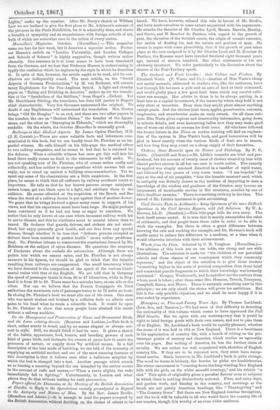Railways in their Medical Aspects. By James Ogden Fletcher, M.D.
(J. E. Cornish.)—There are some valuable facts and inferences com- municated in this book, but we can hardly treat Dr. Fletcher as an im- partial witness. He calls himself on his title-page the medical officer to two railway companies, and he seems to feel that he is retained for the defence. When a scientific witness has once got this well into his head there really seems no limit to the statements he will make. We are not speaking now of Dr. Fletcher, who of course writes coolly and collectedly, and has neither to answer questions which assume but one reply, nor to stand up against a bullying cross-examination. Yet we must say some of his observations are a little suspicious. In the first place, he seems to think that all sufferers by railway accidents resort to imposture. He tells us that he has known persons escape uninjured, return home, get two black eyes in a fight, and attribute them to the collision. He seems offended at the scepticism of the Bench and Bar when the word of a railway doctor is put against that of another doctor. We grant that he brings forward a great many cases in support of his views, and that his experience must have been large. He might perhaps have convinced us if he had not been so eager to convince. We notice that he only knows of one case where incessant railway work led to nerve disease, and this he attributes more to mental labour than to travel. He declares that guards, drivers, and stokers are not short- lived, but enjoy generally good health, and are free from any special disease, though whether it be true that "delicate persons occupied as drivers have been restored to perfect health" seems rather problema- tical. Dr. Fletcher labours to controvert the conclusions formed by Mr. Erichsen on the subject of spine diseases. He questions the accuracy of Duchesne about the maladie des micaniciens. Although these are points into which we cannot enter, and Dr. Fletcher is not always accurate in his figures, we should be glad to think that the injuries resulting from railways are exaggerated. One small inaccuracy which we have detected is the comparison of the speed of the various Conti- nental trains with that of the English. We are told, that in Germany the speed of passenger trainiis from 30 to 47 kilometres, while in Eng- land it is from 28 to 40. There must be a mistake here, on one side or the other. Nor can we believe that the French Compagnie du Nord authorizes the maximum rate of paSsenger trains to be 72 miles an hour. In closing Dr. Fletcher's book we must cite one of his eases. One man who was much shaken and bruised by a collision feels no effects save pains in his head when he reads a scientific book. It would be open to Dr. Fletcher to show that many people have attained this result without a railway accident.






























 Previous page
Previous page